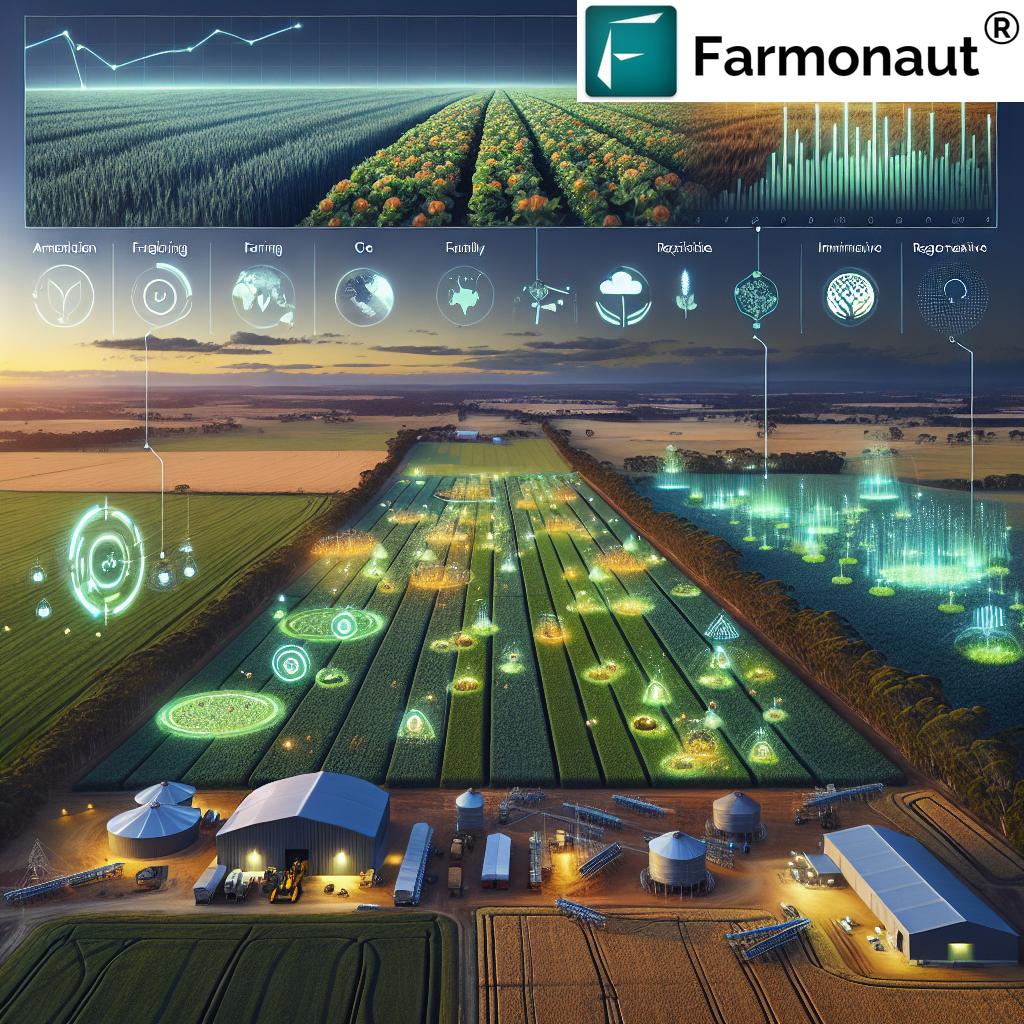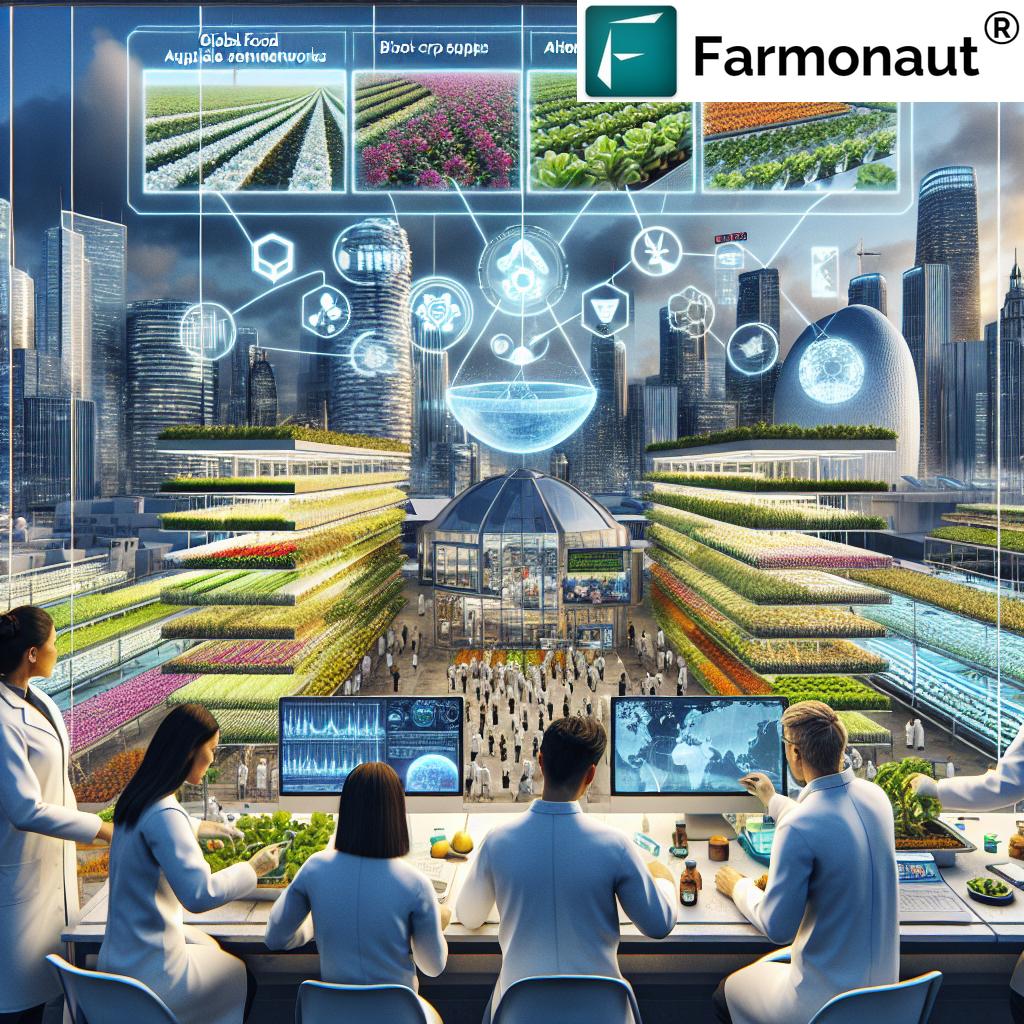Revolutionizing Agriculture: Farmonaut’s AgTech Innovations Drive Sustainable Farming Practices in Australia
“European agri-foodtech startups saw a 70% increase in investments, highlighting rapid sector growth.”
In the ever-evolving landscape of global agriculture, we find ourselves at the cusp of a technological revolution that promises to reshape the way we grow, produce, and distribute food. As we delve into the world of agricultural technology (agtech) and its profound impact on sustainable farming practices, we’ll explore how innovative solutions are addressing some of the most pressing challenges facing our food systems today.
At the forefront of this agricultural transformation is Farmonaut, a pioneering agtech company that’s making waves in Australia and beyond with its cutting-edge satellite imagery technology. By enabling farmers to make data-driven decisions, Farmonaut is not just improving crop health and yield; it’s paving the way for a more sustainable and efficient future of farming.

The Rise of AgTech: A Global Perspective
As we witness the dawn of a new era in agriculture, it’s crucial to understand the global context driving these innovations. The agtech sector has seen unprecedented growth in recent years, with investments pouring in from all corners of the world. This surge in funding is a clear indicator of the industry’s potential to address some of the most pressing issues facing our planet, from food security to climate change.
- Precision Agriculture: Utilizing data-driven insights to optimize farming practices
- Alternative Protein Sources: Developing sustainable options to meet growing global demand
- Climate-Smart Agriculture: Implementing techniques to mitigate and adapt to climate change
- Regenerative Farming: Focusing on soil health and ecosystem restoration
In this rapidly evolving landscape, Farmonaut stands out with its innovative approach to satellite-based farm management. By making precision agriculture affordable and accessible, Farmonaut is democratizing access to advanced farming technologies, particularly in Australia where the vast expanses of agricultural land benefit greatly from satellite monitoring.
Sustainable Farming Practices: The Cornerstone of Future Agriculture
As we navigate the challenges of feeding a growing global population while minimizing our environmental impact, sustainable farming practices have become more critical than ever. Farmonaut’s technology plays a pivotal role in this shift towards sustainability, offering farmers the tools they need to make informed decisions about resource management and crop health.
Key sustainable farming practices enabled by agtech innovations include:
- Precision irrigation systems
- Targeted application of fertilizers and pesticides
- Crop rotation and diversification
- Soil health monitoring and management
By leveraging Farmonaut’s satellite imagery and AI-powered insights, farmers in Australia and beyond can implement these practices more effectively, leading to improved yields, reduced resource waste, and a smaller environmental footprint.
The Power of Precision Agriculture
Precision agriculture represents a paradigm shift in farming practices, allowing for the optimization of inputs and outputs on a micro-scale. Farmonaut’s satellite-based crop health monitoring system is at the heart of this revolution, providing farmers with real-time data on vegetation health, soil moisture levels, and other critical metrics.
Benefits of precision agriculture include:
- Increased crop yields
- Reduced water usage
- Minimized chemical inputs
- Improved soil health
- Enhanced farm profitability
By adopting precision agriculture techniques enabled by Farmonaut’s technology, Australian farmers are not only improving their bottom line but also contributing to the overall sustainability of the agricultural sector.
Explore Farmonaut’s API for advanced satellite data integration
Alternative Protein Sources: Feeding the Future
As global demand for protein continues to rise, the development of alternative protein sources has become a key focus in the agtech world. From plant-based meats to cultured proteins, these innovations are reshaping our food systems and offering more sustainable options for consumers.
While Farmonaut’s technology primarily focuses on crop monitoring, its impact on sustainable farming practices indirectly supports the growth of plant-based protein sources. By optimizing the cultivation of crops used in alternative proteins, Farmonaut contributes to the overall efficiency and sustainability of this emerging sector.

Agri-Foodtech Funding: Fueling Innovation
The recent surge in agri-foodtech funding, particularly in Europe where startups saw a 70% increase in investments, underscores the growing recognition of the sector’s importance. This influx of capital is driving rapid innovation and accelerating the development of new technologies that promise to revolutionize farming practices worldwide.
Key areas attracting investment include:
- Artificial Intelligence and Machine Learning in agriculture
- Robotics and automation
- Vertical farming and controlled environment agriculture
- Blockchain for supply chain transparency
Farmonaut’s success in securing funding and partnerships highlights the industry’s confidence in satellite-based farming solutions. As we continue to see growth in agtech investments, we can expect even more groundbreaking innovations to emerge, further transforming the agricultural landscape in Australia and beyond.
“Farmonaut’s satellite imagery technology enables data-driven decisions for improved crop health and yield across Australia.”
Climate-Smart Agriculture: Adapting to a Changing World
As the effects of climate change become increasingly apparent, the need for climate-smart agricultural practices has never been more urgent. Farmonaut’s technology plays a crucial role in this adaptation process, providing farmers with the tools they need to navigate changing weather patterns and environmental conditions.
Climate-smart agriculture encompasses:
- Drought-resistant crop varieties
- Water-conserving irrigation techniques
- Carbon sequestration practices
- Adaptive pest management strategies
By leveraging Farmonaut’s satellite imagery and AI-powered insights, Australian farmers can make informed decisions about when to plant, irrigate, and harvest their crops, ensuring optimal yields even in the face of unpredictable weather conditions.
Access Farmonaut’s API Developer Docs for advanced integration options
Regenerative Agriculture: Restoring Our Ecosystems
Regenerative agriculture goes beyond sustainable farming practices, focusing on actively improving soil health and restoring ecosystems. This approach not only enhances crop yields but also contributes to carbon sequestration, biodiversity conservation, and overall environmental health.
Key principles of regenerative agriculture include:
- Minimizing soil disturbance
- Maintaining soil cover
- Increasing plant diversity
- Integrating livestock
Farmonaut’s technology supports regenerative agriculture efforts by providing detailed insights into soil health and vegetation patterns. This data allows farmers to make informed decisions about crop rotations, cover cropping, and other practices that promote soil regeneration and ecosystem health.
The Global Food Supply Chain: Technology-Driven Resilience
Recent global events have highlighted the vulnerabilities in our food supply chains, emphasizing the need for more robust and resilient systems. Agtech innovations, including those offered by Farmonaut, are playing a crucial role in strengthening these supply chains and ensuring food security.
Key areas of focus in food supply chain technology include:
- Blockchain-based traceability
- IoT sensors for real-time monitoring
- AI-powered demand forecasting
- Smart logistics and transportation
Farmonaut’s blockchain-based traceability solutions contribute to this effort by providing transparency and authenticity in agricultural supply chains. This technology not only enhances consumer trust but also helps reduce food waste and improve overall supply chain efficiency.
Emerging Opportunities in Asia’s Agricultural Ecosystem
As we look to the future of global agriculture, Asia emerges as a key player with immense potential for growth and innovation. The region’s diverse climates, vast agricultural lands, and rapidly developing economies present unique opportunities for agtech adoption and development.
Key trends in Asia’s agricultural ecosystem include:
- Rapid urbanization driving demand for urban farming solutions
- Increasing adoption of precision agriculture technologies
- Growing market for alternative proteins
- Government initiatives supporting agtech innovation
While Farmonaut’s primary focus has been on Australian agriculture, its satellite-based technology has the potential to make significant impacts across Asia, helping farmers in the region optimize their practices and boost productivity.
The Future of Farming: A Data-Driven Revolution
As we look to the future of agriculture, it’s clear that data will play an increasingly central role in shaping farming practices. Farmonaut’s satellite imagery technology is at the forefront of this data-driven revolution, providing farmers with the insights they need to make informed decisions and optimize their operations.
Key aspects of the future of farming include:
- AI-powered crop management systems
- Predictive analytics for pest and disease control
- Automated farming equipment and robotics
- Personalized nutrition through precision agriculture
By continuing to innovate and expand its offerings, Farmonaut is well-positioned to help farmers navigate this data-rich future, ensuring that Australian agriculture remains at the cutting edge of global farming practices.
Global Investment Trends and Impact in AgTech
| AgTech Sector | Investment Growth (%) | Key Innovations | Environmental Impact |
|---|---|---|---|
| Precision Agriculture | 85% | AI-driven crop monitoring, Variable rate technology | Reduced water usage, Optimized fertilizer application |
| Alternative Proteins | 120% | Plant-based meats, Cultured proteins | Lower carbon emissions, Reduced land use |
| Climate-Smart Farming | 95% | Drought-resistant crops, Carbon sequestration techniques | Increased resilience to climate change, Reduced GHG emissions |
| Satellite Imagery | 70% | High-resolution crop monitoring, AI-powered analytics | Improved resource management, Enhanced biodiversity conservation |
Conclusion: Embracing the AgTech Revolution
As we’ve explored throughout this comprehensive overview, the agricultural technology sector is experiencing unprecedented growth and innovation. From precision agriculture and alternative protein sources to climate-smart farming and regenerative practices, agtech is reshaping the way we approach food production and sustainability.
At the heart of this revolution is Farmonaut, whose cutting-edge satellite imagery technology is empowering farmers across Australia to make data-driven decisions that improve crop health, yield, and overall farm productivity. By making precision agriculture more accessible and affordable, Farmonaut is not just transforming individual farms; it’s contributing to the broader goal of creating a more sustainable and resilient global food system.
As we look to the future, it’s clear that the integration of technologies like AI, blockchain, and satellite imagery will continue to drive innovation in agriculture. With companies like Farmonaut leading the way, we can be optimistic about our ability to meet the challenges of feeding a growing global population while preserving our planet’s precious resources.
The agtech revolution is here, and it’s transforming agriculture one satellite image at a time. As we embrace these innovations, we move closer to a future where sustainable farming practices are the norm, ensuring food security and environmental stewardship for generations to come.
Frequently Asked Questions
- What is precision agriculture, and how does Farmonaut support it?
Precision agriculture is an approach that uses data-driven insights to optimize farming practices. Farmonaut supports this by providing satellite-based crop health monitoring, enabling farmers to make informed decisions about irrigation, fertilizer usage, and pest management. - How does satellite imagery improve crop health and yield?
Satellite imagery allows farmers to monitor large areas of land efficiently, detecting issues like pest infestations or nutrient deficiencies early. This early detection enables prompt intervention, leading to improved crop health and higher yields. - What are some key sustainable farming practices enabled by agtech?
Agtech enables practices such as precision irrigation, targeted application of inputs, crop rotation based on data-driven insights, and soil health monitoring. These practices help reduce resource waste and minimize environmental impact. - How is climate-smart agriculture addressing environmental challenges?
Climate-smart agriculture uses techniques like drought-resistant crop varieties, water-conserving irrigation, and carbon sequestration practices to mitigate and adapt to climate change impacts on farming. - What role does blockchain play in agricultural supply chains?
Blockchain technology enhances transparency and traceability in agricultural supply chains, allowing consumers to verify the origin and journey of their food products, reducing fraud, and building trust.






